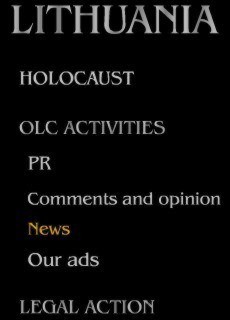|
VILNIUS—Defending History confirmed today that renowned documentary film maker and Holocaust researcher Saulius Beržinis, founding director of the Independent Holocaust Archive of Lithuania (IHAL), has been the latest recipient of a letter from police on account of his work documenting the alleged Nazi collaboration of various Lithuanian “1941 freedom fighters” who allegedly collaborated with the Nazi regime and in the murder of their civilian Jewish-citizen neighbors in the days, weeks and months following 22 June 1941. The letter demands he turn over a “list” of criminals which it was never his, nor the Archives’ intention, to produce or comment upon. Over the years, the Holocaust specialist has won the confidence of groups worldwide for his willingness to seek out and tell the unvarnished truth, among them the Wiesenthal Center’s Israel office.
The March 19th letter to IHAL’s director, letterheaded “Vilnius Country Police Headquarters, First Vilnius City Police Headquarters, Criminal Division of the Police” is reproduced below.
Saulius Beržinis has been collecting testimonies on the Holocaust for a quarter of a century. He is known internationally for his singular achievement of interviewing on camera actual admitted killers (some are in the film Lovely Faces of the Killers, 2002), and his extensive documentation work with survivors and witnesses. He has partnered over the years with BBC, The United States Holocaust Museum, the Vilna Gaon Jewish State Museum of Lithuania, Yad Vashem, and other international bodies, in addition to dozens of Holocaust survivors. His Holocaust documentaries include Farewell Jerusalem of Lithuania (1994), Yudel’s Unwritten Diary (2004), The Road to Treblinka (1997). Most recently, his film on the Holocaust in Jurbarkas (Yúrberik) became controversial for daring to name the killers of the town’s Jewish citizens in 1941 (see reviews by Milan Chersonski and Geoff Vasil).
The state’s honoring of alleged Nazi collaborators in the country reached a high point in 2012 when the remains of the 1941 Nazi puppet prime minister, Juozas Ambrazevičius-Brazaitis were reburied by the government with full honors, among much fanfare. Ambrazavicius had personally signed the Lithuanian versions of the Nazi-origin orders committing the Jewish citizens of his city, Kaunas (Kovno), to a concentration camp (actually the Seventh Fort murder camp) and the remainder to a ghetto. One of the few to dare film the May 2012 reinterment was Beržinis.
Apparently all part of the Melamed and Grabauskas “investigations.” But should the police be disturbing citizens who work to find out about the local collaboration with the Nazis and partnership in the Holocaust?
The state glorification of alleged collaborators includes permanent exhibits at the “Genocide Museum” in Vilnius, and most painfully for Holocaust survivors and their families, the naming of streets and squares and a lecture hall at Vytautas Magnus University in Kaunas for alleged Nazi collaborators (see DH sections on glorifying collaborators, and articles by Evaldas Balčiūnas; international petition).
The campaign by prosecutors and police to intimidate and silence Holocaust research reached its own highpoint in 2011, when Interpol was asked to disturb Holocaust survivor and elected chairperson of the last active group of Litvak survivors in the world, Tel Aviv attorney Joseph Melamed. Melamed is the author of the 1999 book Crime and Punishment which called for investigation and where possible, prosecution, of alleged Nazi war criminals. Vilnius prosecutors’ (ab)use of Interpol drew reaction in the British Parliament.
In recent months, Giedrius Grabauskas, the author of an article questioning state glorification of alleged collaborators, has been investigated by police and threatened with prosecution. It seems that this latest latest letter is a further step in same campaign of using police and prosecutors to settle historic disagreements that form the subject of academic conferences, books and competing evidence in the free market of ideas.
defendinghistory.com
|


